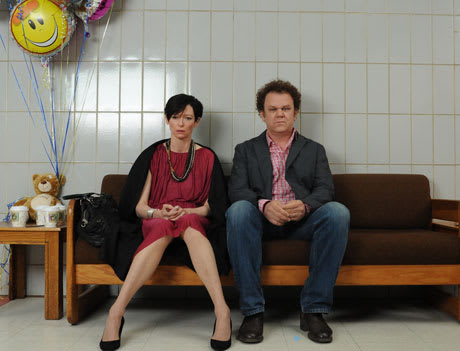Beyond the obvious sense of realist discomfort and ambiguity present in Lynne Ramsay's films, there is also the unique tactile sense of immersion. Along with seeing the set design and colour palette, we get a sense of the smells and textures present. We notice the dirt in the corner of a room, or the scrape on a chair routinely used by the characters that, incidentally, often appear unkempt and wear the same outfits throughout.
In We Need to Talk About Kevin, the adaptation of the Lionel Shriver novel, this particular directorial skill exacerbates the tension and sense of grotesque, caged repetition of bewildered mother Eva (Tilda Swinton), trapped at home with her perpetually unbalanced, sociopathic son Kevin (Ezra Miller/Jasper Newell) throughout the years.
Jumping back and forth in time, from Kevin's conception to Eva's eventual social damnation after her son goes on a killing spree in his teen years, Ramsay's inconclusive exploration of nature versus nurture focuses on unease and maternal guilt rather than actual plot points. While Kevin's upbringing is told in a linear fashion, broken up by present day moments of Eva being assaulted and sneered at by locals, the impetus is behind the reactions and the sense that something unspoken is very wrong.
Ramsay is careful not to depict the many scenes between mother and son with a specificity that leads the audience to conclusion or blame, rather she balances it with Kevin's irrational, but consistent sociopathic manipulation and rage, mixing it with Eva's occasional frustrated reactions and resultant self-loathing. She undeniably blames herself for bringing such a person into the world, but at the end of the film, it's questionable whether the audience will.
Unsurprisingly, this isn't an easy movie to watch, featuring an endless array of unsettling and cringe-worthy moments, even of simple things, like Kevin chewing his nails and lining them up for his mother during a detention centre visitation.
Like Ratcatcher and Morvern Callar, Ramsay has no interest in lightening the mood or making things more palatable for the viewer, instead cutting to the unseemly, discomforting centre of any given moment, delivering an unflinching, upsetting and intelligent assessment of a complex relationship.
(eOne)In We Need to Talk About Kevin, the adaptation of the Lionel Shriver novel, this particular directorial skill exacerbates the tension and sense of grotesque, caged repetition of bewildered mother Eva (Tilda Swinton), trapped at home with her perpetually unbalanced, sociopathic son Kevin (Ezra Miller/Jasper Newell) throughout the years.
Jumping back and forth in time, from Kevin's conception to Eva's eventual social damnation after her son goes on a killing spree in his teen years, Ramsay's inconclusive exploration of nature versus nurture focuses on unease and maternal guilt rather than actual plot points. While Kevin's upbringing is told in a linear fashion, broken up by present day moments of Eva being assaulted and sneered at by locals, the impetus is behind the reactions and the sense that something unspoken is very wrong.
Ramsay is careful not to depict the many scenes between mother and son with a specificity that leads the audience to conclusion or blame, rather she balances it with Kevin's irrational, but consistent sociopathic manipulation and rage, mixing it with Eva's occasional frustrated reactions and resultant self-loathing. She undeniably blames herself for bringing such a person into the world, but at the end of the film, it's questionable whether the audience will.
Unsurprisingly, this isn't an easy movie to watch, featuring an endless array of unsettling and cringe-worthy moments, even of simple things, like Kevin chewing his nails and lining them up for his mother during a detention centre visitation.
Like Ratcatcher and Morvern Callar, Ramsay has no interest in lightening the mood or making things more palatable for the viewer, instead cutting to the unseemly, discomforting centre of any given moment, delivering an unflinching, upsetting and intelligent assessment of a complex relationship.
